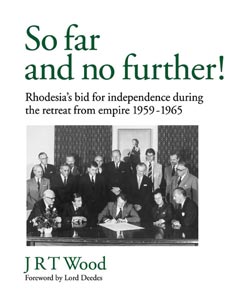
So Far and No Further!
Ian Smith's unilateral declaration of independence for Rhodesia (now Zimbabwe) on 11 November 1965 was seen by many as the act of a rebellious white minority seeking to preserve their privileged position in defiance of Britain's determination to shed her Empire and introduce rule by the African majority as soon as possible.
However, the drama of UDI has long overshadowed and oversimplified the complexities of the preceding years. In this account of that time, based on sole access to the hitherto closed papers of Ian Douglas Smith and Sir Roy Welensky, as well as extensive research at London's Public Record Office, and in government and private collections elsewhere, Dr J.R.T. Wood chronicles the collision course on which Britain and Rhodesia were set after 1959, complementing his study of the fate of the Federation of Rhodesia and Nyasaland in his definitive 'The Welensky Papers: A History of the Federation of Rhodesia and Nyasaland 1953-1963'.
Britain, Wood shows, was intent on shedding her Empire as quickly as possible against a backdrop of the Cold War and the rise of Chinese- and Soviet-sponsored African nationalism. She delivered some 600 one man, one vote constitutions to her fledgling nations and had no intention of granting Rhodesia independence on different terms. Unlike Britain's other African possessions, however, Rhodesia had enjoyed self-governance since 1923. The largely white Rhodesian electorate, wary of the consequences of premature and ill-prepared majority rule, sought instead dominion status akin to that of Canada, Australia and New Zealand. Their intention was gradually to pave the way for majority rule: since 1923, Rhodesia's electoral qualifications had excluded race. It was always understood that the African majority would acquire power; the concern was the speed and smoothness of that acquisition.
Culminating in those dramatic days of November 1965 when Ian Smith concluded in the face of resolute British stonewalling that he had no alternative but UDI, this unique account is the first in a series which chronicles the course of events that ultimately led to Robert Mugabe's accession to power in 1980, and all that entailed.